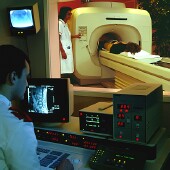
MONDAY, March 1 (HealthDay News) — Too many primary care doctors are making inappropriate patients referrals for CT and MRI scans, according to a new study.
Researchers analyzed medical records from 459 elective outpatient CT and MRI examinations conducted at Harborview Medical Center in Seattle. All the patients were referred by primary care physicians.
“Of the 459 reviewed, 74 percent were considered appropriate and 26 percent were considered inappropriate. Fifty-eight percent of the appropriate studies were positive and affected subsequent management, while only 24 percent of inappropriate studies were positive, affecting management,” said lead author Dr. Robert L. Bree.
Inappropriate exams included brain CT for chronic headache, lumbar spine MRI for acute back pain, and knee or shoulder MRI in patients with osteoarthritis.
“Our study shows that CT and MRI examinations ordered in the outpatient primary care setting are frequently not appropriate based on the application of a national radiology benefit management company’s evidence-based guidelines,” Bree said.
“A high percentage of examinations not meeting appropriateness criteria and subsequently yielding negative results suggest a need for tools to help primary care physicians improve the quality of their imaging decision requests,” he added.
The study appears in the March issue of the Journal of the American College of Radiology.
Bree said the findings are “important information for policy makers as they struggle with physicians and patients who are unhappy with restrictive utilization management programs and payers and the public who are looking for ways to decrease health care costs and increase quality and safety of exams in an era of higher awareness of effects of excess radiation. A reasonable compromise might be found in the newly emerging clinical decision support systems.”
More information
The U.S. Food and Drug Administration has more about medical imaging.

